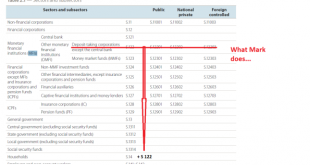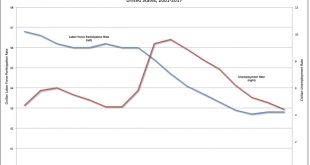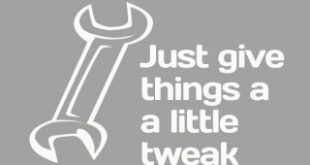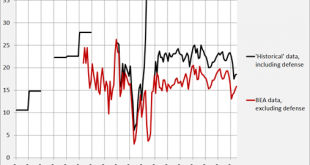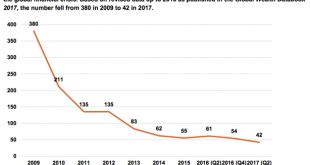from Michel Zouboulaki and RWER issue 82 An outstanding neoclassical microeconomist, Hal Varian, asked the emphatic question of “What use is economic theory?” To answer the question, he started by recognizing the obvious: “Economics is a policy science and, as such, the contribution of economic theory to economics should be measured on how well economic theory contributes to the understanding and conduct of economic policy” (1997, 109). But this acknowledgement should have led Varian in...
Read More »Wren-Lewis on internal consistency
from Lars Syll The example is the derivation of a benevolent policy maker’s preferences from the utility function of the representative consumer assumed as part of the model, a line of research initiated by Michael Woodford. Before getting on to the values point, let me note that it is a good example of the primacy of internal consistency in microfoundations rather than the Lucas critique. Before Woodford’s work, microfoundations macroeconomists were embarrassed that they typically...
Read More »What Mark does. Lack of institutional precision in neoclassical macro leads to an incoherent monetary model
S Source (p. 32) Oops. Mark Gertler (with Kiyotaki and Prestipino) does it again: “There has been considerable progress in developing macroeconomic models of banking crises. However, most of this literature focuses on the retail sector where banks obtain deposits from households.” After ‘obtaining’ deposits, these banks are supposed to lend the ‘money’ to households and companies. Source: the 2000+ pages Handbook of [neoclassical, M.K.] Macroeconomics edited by John Taylor. As we know,...
Read More »Branko Milanovic and the hypocrites of the World Economic Forum
from Lars Syll Thousands of people will gather next week in Davos. Their combined wealth will reach several hundred billion dollars, perhaps even close to a trillion. Never in world history will be the amount of wealth per square foot so high. And this year, for the sixth or seventh consecutive time, what would be one of the principal topics addressed by these captains of industry, billionaires, employers of thousands of people across the four corners of the globe: inequality… Only in...
Read More »Dr. Richard Bush | Dean, Baker College, USA | International Startup Conference | Dec. 2017 | India
Dr. Richard Bush, Dean, Baker College, Michigan, USA was the keynote speaker at the Yuvbharat'sInternational Startup Conference | 14, 15 December. 2017 | Visakhapatnam, India.
Read More »The curious silence of the British media regarding Mark Carney and the secretive G30
from Norbert Häring The governor of the Bank of England, Mark Carney has at least two things in common with Mario Draghi, the president of the European Central Bank (ECB): He worked for Goldman Sachs before becoming a central banker, and he is a member of the Group of Thirty. The EU-Ombudsman has just called it maladministration on the part of the ECB to let Mario Draghi be a member of that secretive bankers’ club. This should invite the question: What about Mark Carney and the Bank of...
Read More »Utopia and the right to be lazy (3 charts)
David Ruccio Students are much too busy to think these days. So, when a junior comes to talk with me about the possibility of my directing their senior thesis, I ask them about their topic—and then their schedule. I explain to them that, if they really want to do a good project, they’re going to have to quit half the things they’re involved in. They look at me as if I’m crazy. “Really?! But I’ve signed up for all these interesting clubs and volunteer projects and intramural sports and. ....
Read More »New Keynesian ‘tweaking’ won’t do the job
from Lars Syll Whereas the Great Depression of the 1930s produced Keynesian economics, and the stagflation of the 1970s produced Milton Friedman’s monetarism, the Great Recession has produced no similar intellectual shift. This is deeply depressing to young students of economics, who hoped for a suitably challenging response from the profession. Why has there been none? Krugman’s answer is typically ingenious: the old macroeconomics was, as the saying goes, “good enough for government...
Read More »Edward Prescott and the illicit use of garbled language
John Taylor edited the new 2000+ pages plus ‘Handbook of macro-economics’, effectively a ‘Handbook of neoclassical macroeconomics’. Neoclassical economics is known for its illicit use of garbled language which hides and convolutes instead of explains. As the title of the book exemplifies. An interesting example is the chapter by Edward Prescott, titled ‘RBC Methodology and the Development of Aggregate Economic Theory’ (ungated version). Let’s first give the floor to him (emphasis added),...
Read More »42 people vs. 3.7 billion people
from David Ruccio According to Oxfam’s analysis of data produced by Credit Suisse (which I analyzed in a different manner late last year), 42 billionaires now own the same wealth as the bottom half—3.7 billion people—of the world’s population. Together, those 3.7 billion people own only one half of one percent (0.53 percent) of the world’s wealth, a figure that rises to just about one percent (0.96 percent) when net debt is excluded. In 2017, 42 billionaires on the Forbes billionaires...
Read More » Real-World Economics Review
Real-World Economics Review


